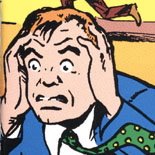Essentials
I'm curious about the recommended reading lists attached to the 2 page origins in the back of 52.
What criteria was used to determine "essential storylines"? Are these the stories you have read to understand these characters? Are these the best stories told using the character? Or are they just what's been collected into trade paperbacks, recommending the individual issues only as a last resort?
Take last week's recommended reading for Batman, for example. It's hard to argue with Batman: Year One on that list. It's not only THE definitive origin for Batman for the last twenty years, it's also a hell of a good story. But The Bat-Man in The Batman Chronicles is hardly the same character written now, and Batman: The Greatest Stories Ever Told isn't one coherent storyline at all (though I guess the individual issues collected could be considered essential).
But the real standout on the list is The Dark Knight Returns. It's the only storyline recommended so far that is absolutely out of continuity, a story set in the dark alternate future of 1986. Reading that book will NOT get anyone not familiar with Batman up to speed with the character currently starring in Detective Comics.
And yet...
No book* in the last 20 years has had such an effect on how Batman is written as Dark Knight Returns. Batman as obsessive, as fanatical, violent, asshole-ish, all comes from Frank Miller's depiction of what Batman would be like when he's old enough to have a late life crisis. So while reading the book won't give you the history of Bruce Wayne, you DO kind of HAVE TO read it to understand the history of Batman as a character.
But then ANY book could be Essential, if it has a profound effect on a character. Watchmen is essential reading for all the Charlton characters running around the DCU, especially the Question, Blue Beetle, or Captain Atom (hmmm....). All Star Superman will almost certainly become essential. And Kingdom Come, for good or ill, is absolutely necessary to read to understand why the DCU looks the way it does.
I guess it's just further proof that saying this story changes everything and this one changes nothing means nothing, and that any story could be the one that really takes characters to somewhere new. So why worry whether it lines up with other depictions. It's all Hypertime anyhow...
*arguably, Dini and Timm's Batman: The Animated Series is an even bigger influence, but the recommended list seems limited to books.



1 comment:
I guess it depends on what you mean by "essential" - "necessary" or "captures the essense of". The Batman Chronicles and The Dark Knight Returns fit the second meaning better. So does The Batman Adventures, if we're not allowed DVDs.
Post a Comment